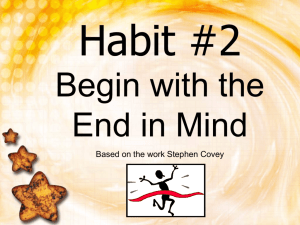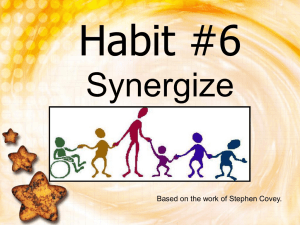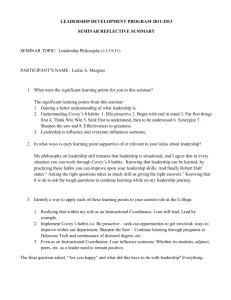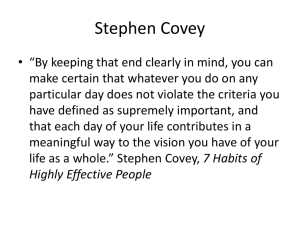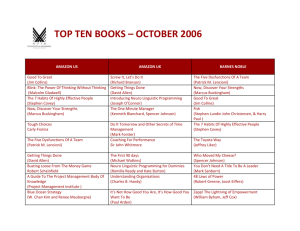Introduction to Pastoral Care
advertisement
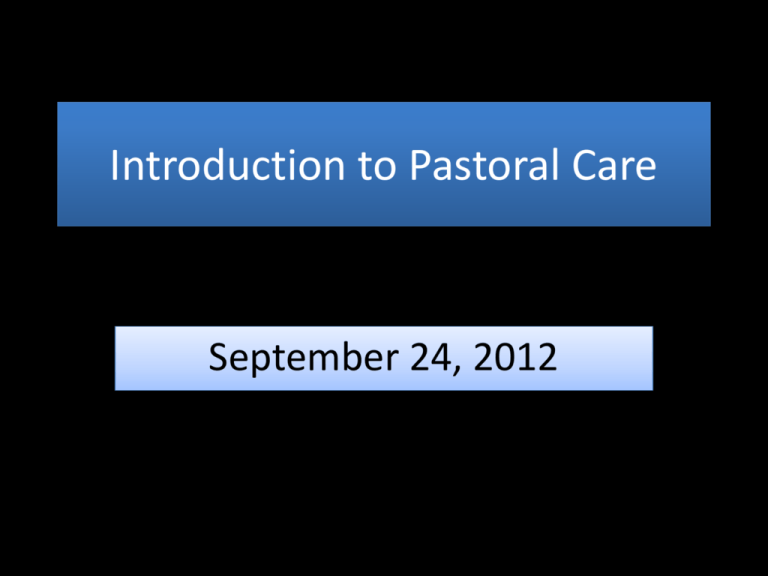
Introduction to Pastoral Care September 24, 2012 “In our role as pastoral care givers, the more dramatic the parishioner’s story (say it involves incredible acting out with wild drinking behavior, or homicidal or suicidal behavior, or physical abuse) the more we as helpers are likely to become anxious. The higher our anxiety level the more we feel the expectation to rescue particular individuals in difficulty” Couples in Conflict by Ronald W. Richardson We, as caregivers, should attain a workable level of interested detachment. Neutrality “is the best way we can help people with emotional conflicts & difficulties.” Couples in Conflict by Ronald W. Richardson Learn to manage your own anxiety and need to rescue others. Learn to become a less-anxious presence and a calm observer. “We have such a tendency to rush in, to fix things up with good advice. But we often fail to take the time to diagnose, to really, deeply understand the problem first.” The 7 Habits of Highly Effective People by Stephen Covey “If I were to summarize in one sentence the single most important principle I have learned in the field of interpersonal relations, it would be this; Seek first to understand then to be understood. This principle is the key to effective interpersonal communication” The 7 Habits of Highly Effective People by Stephen Covey “Communication is the most important skill in life.” • • • • Four Basic Types of Communication Reading Writing Speaking Listening The 7 Habits of Highly Effective People by Stephen Covey Empathic Listening “Seek first to understand involves a very deep shift in paradigm. We typically seek first to be understood. Most people do not listen with the intent to understand; they listen with the intent to reply. They’re either speaking or preparing to speak. They’re filtering everything through their own paradigms, reading their autobiography into other people’s lives.” The 7 Habits of Highly Effective People Stephen Covey Empathic Listening “We’re all filled with our own rightness, our own autobiography. We want to be understood.” “When another person speaks, we’re usually listening at one of four levels.” The 7 Habits of Highly Effective People Stephen Covey Empathic Listening 1. Ignoring – we aren’t really listening at all. 2. Pretending – Yeah. Uh-huh. Right. 3. Selective listening – hearing only parts of a conversation. 4. Attentive listening – we pay attention and focus on the words. The 7 Habits of Highly Effective People Stephen Covey Empathic Listening • “Listening with intent to understand.” • “Get inside another person’s frame of reference.” See the world like they see it. • “Deeply understand that person, emotionally as well as intellectually.” • “Listen with your ears, listen with your eyes and with your heart.” Listen for feeling & meaning. • “When you listen with empathy to another person, you give them psychological air.” The 7 Habits of Highly Effective People Stephen Covey Empathic Listening “Seeking first to understand, diagnosing before you prescribe, is hard.” The 7 Habits of Highly Effective People Stephen Covey Four Autobiographical Responses 1. We evaluate – we either agree or disagree. 2. We probe – we ask questions from our own frame of reference. 3. We advise – we give counsel based on our own experience. 4. We interpret – we try to figure people out, to explain their motives, their behavior, based on our motives & behavior. Four Stages of Empathic Listening 1. 2. 3. 4. Mimic Content – active or reflective listening. Rephrase Content. Reflect Feeling. Rephrase Content & Reflect Feeling. As we rephrase content & reflect feeling, we give the other person psychological air. We give them space to work through their thoughts & feelings for themselves. We help them take responsibility for their own lives. Don’t push or rush – be patient & respectful. “When people are really hurting & you really listen with a pure desire to understand, you’ll be amazed how fast they will open up. They want to open up.” The 7 Habits of Highly Effective People Stephen Covey Empathic Listening • Love unconditionally. • Refuse to judge or ridicule. • “The skills will not be effective unless they come from a sincere desire to understand.” The 7 Habits of Highly Effective People Stephen Covey
